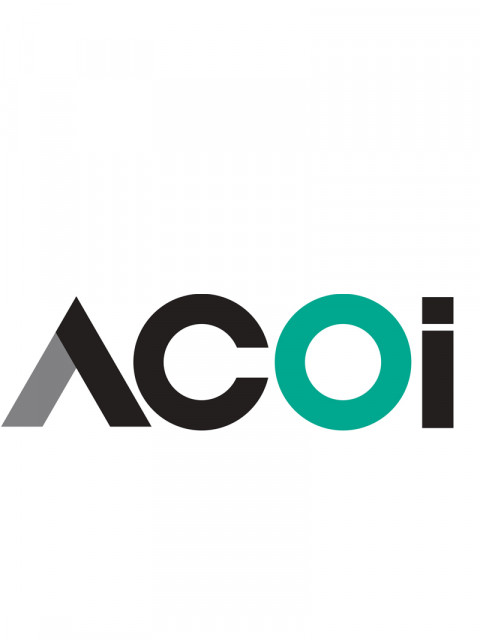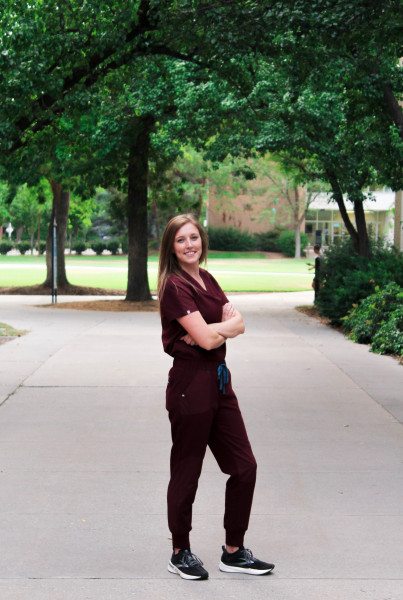
Through Insightful Research and Care, Seeing and Serving Differently
by ACOI
November 20, 2024
 Research and scholarship are essential to a medical student’s journey, but it’s often much more than a step taken out of sheer necessity. That was the case when it came to Alexandria (Allie) Ahlm, the ACOI 2024 student poster contest winner. Ahlm presented her work – “Sensitivity and Specificity of Waist-to-Height Ratio in Screening for Type 2 Diabetes Among Asian Americans” – at ACOI 2024 in Scottsdale, Arizona, highlighting a major medical problem across the U.S. It’s also a cultural issue, one that Ahlm sees and works to resolve in her third-year clinical rotation at Cassia Regional Hospital every day.
Research and scholarship are essential to a medical student’s journey, but it’s often much more than a step taken out of sheer necessity. That was the case when it came to Alexandria (Allie) Ahlm, the ACOI 2024 student poster contest winner. Ahlm presented her work – “Sensitivity and Specificity of Waist-to-Height Ratio in Screening for Type 2 Diabetes Among Asian Americans” – at ACOI 2024 in Scottsdale, Arizona, highlighting a major medical problem across the U.S. It’s also a cultural issue, one that Ahlm sees and works to resolve in her third-year clinical rotation at Cassia Regional Hospital every day.
“Diabetes management is huge right now,” she said, “but my interest in this research topic specifically was more related to the underdiagnosis of certain demographics. My focus – and the reason I came upon it – was wanting to focus on those underserved demographics. That it was on diabetes made it all the better in terms of impact and usefulness.”
The effectiveness of examining data that is not BMI in screening for and diagnosing type 2 diabetes is already a well-researched pattern. Going beyond and applying it to an underdiagnosed population is an innovative way to reach that group – and a step toward using a big-picture, contextual perspective to do so.
That approach has a twofold impact: one, as Ahlm put it, in “remembering as practitioners that a number like BMI won’t tell us everything we need to know. We need to look at the person.” And two, in finding different ways of connecting with underserved populations, whether that means those who face difficulties in accessing care or who are typically underdiagnosed.
How a Holistic View Helps a Community
For Ahlm, that impact is the whole point. Well before beginning medical school in 2022, she had a goal of practicing osteopathic medicine. Even that was a holistic decision: a voracious learner when it comes to the material, she is decisive about wanting to learn about it for the rest of her life. Ahlm also greatly values the close and intimate relationships she has with patients, especially in Burley, Idaho, where Cassia Regional Hospital is located.
Having grown up in a military family, Ahlm has called several locations home, but the time she spent in Idaho was highly formative. Alongside her clear idea of wanting to go into osteopathic medicine was a desire to return there – and serve a rural area in particular. Her reasons went beyond her close connection to that region and population.
“Osteopathic medicine,” she explained, “appeals to a part of rural culture that can be distrustful of modern medicine. Osteopathic medicine doesn’t just say, ‘We’ll give you a pill and send you home.’ We look at the whole person and get to the core and root of things the best that we can.
“It’s an approach that is really valuable to me, and I knew that would resonate with the target audience where I wanted to be.”
Ahlm has encountered myriad examples of this in her rotations. One memorable such experience had to do with a patient who came into the hospital in a clear state of diabetic ketoacidosis. She recounts how poorly they were doing, even having difficulty breathing; after evaluating the patient, it was clear they had not been taking their medication. Still, the patient was insistent that their symptoms were related to stress. Rather than become frustrated with or shut down this line of thinking, Ahlm responded differently, in a way that got the patient’s attention and won their trust.
“It would be easy as a physician to look at that patient and say, ‘The only reason for this is that they’re not taking their medication.’ That was absolutely the main contributor—but I found it so important to validate their experience, because stress is hard on the body, and you do have a physiological response to it. That would exacerbate someone’s symptoms,” she said. “And that whole-person perspective allowed me to validate that the stress of this patient’s life made their diabetic ketoacidosis worse, without neglecting the importance of medication.
“In fact, they had been so stressed that they had missed doses and were unable to keep up with when they had or had not taken it. This experience was connected with them as a whole—mind, body, and spirit.” It was a moment that reemphasized how critical it is to listen to each person and understand their experience, and use knowledge as a foundation for doing so, to better give patients the tools that help them become and stay healthy.
Medicine as a Personal Mission
 Ahlm is a NHSC scholar, and in return for her scholarship, she intends to provide primary care to underserved communities after graduating from the Pacific Northwest University (PNWU) College of Osteopathic Medicine. Pursuing her osteopathic medical education at PNWU was a major part of this desire to address the communities that are so important to her, as that is central to their focus and mission – especially when it comes to their five-state region of focus (Alaska, Idaho, Montana, Oregon, and Washington).
Ahlm is a NHSC scholar, and in return for her scholarship, she intends to provide primary care to underserved communities after graduating from the Pacific Northwest University (PNWU) College of Osteopathic Medicine. Pursuing her osteopathic medical education at PNWU was a major part of this desire to address the communities that are so important to her, as that is central to their focus and mission – especially when it comes to their five-state region of focus (Alaska, Idaho, Montana, Oregon, and Washington).
“As someone who is fairly mission-driven,” she said, “having a school that understands that is really valuable to me. Ultimately, being able to allocate resources to the neediest of communities is important…I knew that was what I wanted to do, so I charted a path to make sure that was what I did.”
Mark Baldwin, DO, MACOI, works closely with Ahlm at PNWU, and their connection through both PNWU and ACOI greatly empowers this level of empathic service. When asked about her, Dr. Baldwin said:
“Allie is one of the finest students that I have worked with while at PNWU. She brings a refreshing maturity and world experience along with a deep commitment and compassion toward patient care. Academically she is an outstanding student...her questions and interests [on the course material] reflect a deep understanding of concepts and a desire for a deeper context. The quality of her research and her interests reflect a keen appreciation of not only the topics but also in study design. In many ways she reflects the best of our program at Pacific Northwest University. She has a promising career ahead of her, be it in Internal Medicine, family medicine, or research.”

